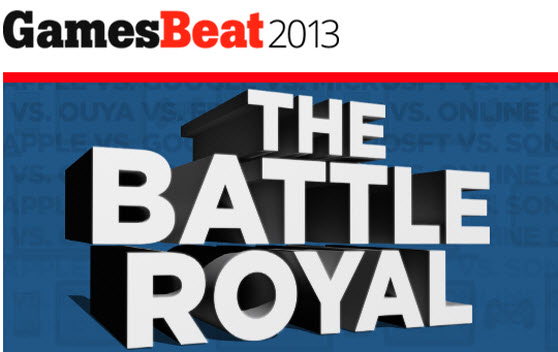Some companies are making a killing in mobile games, and they’re making it look easy. Others are struggling with the challenge of people finding their games among a sea of titles. But producing big entertainment hits is still more art than science, and that’s true in mobile games as well.
Smartphones have been growing as a game platform since 2007, when Apple’s iPhone debuted. Tablet games have been on the rise since 2010, with the iPad launch. Now the market supports both iOS and Android as strong dueling ecosystems. The market is so much bigger now, with 50 billion apps downloaded from the App Store and $10 billion paid by Apple to developers. And games are the No. 1 category for generating revenues on the mobile platforms. But it seems like it’s no easier for individual companies to consistently stay on the top of the rankings.
We’ll be talking about the shifting mobile gaming landscape at MobileBeat 2013 in a mainstage panel discussion at 4:05 p.m. on Wednesday. The session, dubbed, “We’re not playing around anymore,” will feature Clive Downie, chief executive of DeNA West; Anil Dharni, chief operating officer at Gree International; and Eric Setton, chief technology officer at Tango. I’ll moderate it, with a focus on the lessons that gaming can provide for the larger mobile industry.
I’ll also be moderating a fireside chat session with Tapjoy’s Jeff Drobick, chief product officer at Tapjoy, at 11:05 am on Tuesday. Drobick, who recently joined the mobile monetization firm from eBay, will focus on creating value in the mobile ecosystem through new marketing and promotion techniques that help games spread. Tapjoy has reached a billion app users through its mobile ad network and offer walls, but it is evolving its model toward secondary actions, nonincentivized installs, and nongame monetization efforts, too.
While the topics are similar to what we’ve talked about in years past (see our posts from 2011 and 2012 here and here), the landscape of key players is different. A year ago, companies like GungHo Entertainment, Supercell, and Kakao Corp. were unknown in mobile gaming circles. Now they’re the talk of the town.
Japan’s GungHo created Puzzle & Dragons, a mashup of a fantasy role-playing game and Bejeweled, and the game is on its way to generating $1 billion in revenue, due in large part because Japanese fans are spending a fortune in the free-to-play game. Helsinki-based Supercell raised $130 million at a massive valuation of $770 million in April, thanks to the success of its Hay Day and Clash of Clans mobile titles, which have stayed at the top of the top-grossing app charts. Meanwhile, companies that haven’t scored more and more hits in mobile such as Zynga are faltering.
How can companies cope and compete in this context? We’ll talk about that in our sessions.
These two sessions at MobileBeat 2013 will set the stage for GamesBeat 2013, which will be held as a stand-alone conference this year on Oct. 29-Oct. 30 at the Sofitel Hotel in Redwood City, Calif. That event will feature 80 speakers focusing on our theme of The Battle Royal, which is the all-out competition that ensues as the barriers between different segments of the game business come down and all companies compete with each other. The mobile game market will eventually become the biggest part of that competition, and we’ll focus on how it will all play out.
VentureBeat's mission is to be a digital town square for technical decision-makers to gain knowledge about transformative enterprise technology and transact. Learn More

